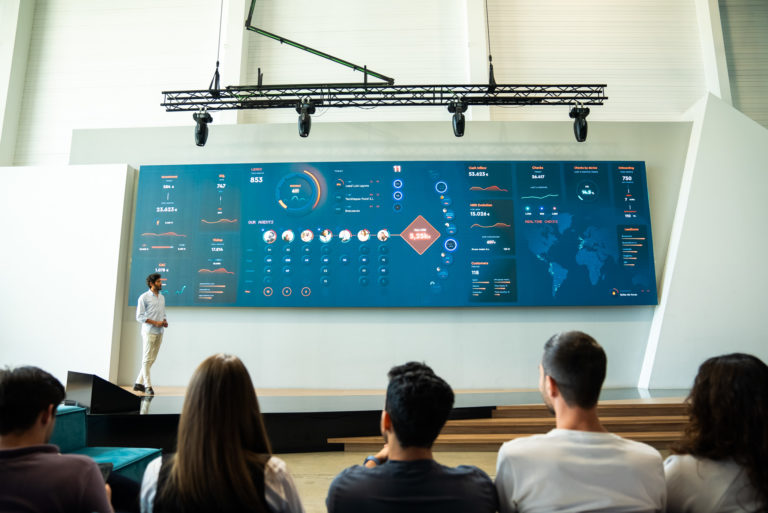Motivation and data

What moves us in behaving, taking a decision or feeling one way or another?
Can we, or our managers change something in our way of being and our reactions related to this, can a system optimize that?
Let’s go and dig in :).
The specialists in human behaviour have investigated a lot in this area, we know about intrinsic and extrinsic motivations and we have the intuition that the intrinsic motivation is what really matters, even if most companies use the extrinsic motivation maybe because it is easier to implement, giving a raise, a bonification or a paid vacation.
Once an individual has a lifestyle that is content with, money and extra rewards stop to incentive the person in doing a better job, so what can we do as managers?
It takes a lot of self knowledge to dig in into your own motivation and activate our own.
What is inside us is sometimes hidden even to ourselves. Luckily there are people like Daniel Pink that investigated the theory of motivation and found surprising facts, there are only 3 pillars that provide the real motivation that we all strive, so besides the personal work, we can pass on to our companies and managers the following factors to work upon:
1. Autonomy
We like to manage ourselves, is there any person who likes “to be managed”? 🙂
People want to organise their work themselves. That is why so many people fantasise about having their own business, not because they have the skills of an entrepreneur, they just don’t want to be told what to do and how to do things, and to depend on the moods of a boss.
Luckily, many companies implemented work environments based on results, having KPIs or OKRs. If the companies have also a datavisualization model and the decision can be based on data, seizing opportunities and being empowered to take action, the error margin tends to be 0. The data based decisions are the best ones, and specially when they create emotions like: contentment, in control, enthusiasm if surpass the targets, adrenaline to further work in order to accomplish, the positive feeling of being part of a good team, seeing the company or your colleagues OKRs, and all these because of the visualisation part that occurs every day.
Autonomy is not independence, it means that we can choose in a frame designed by the company. The sensation of autonomy has a high impact on our attitude and productivity, they generate feelings of freedom and empowered.
Resuming, knowing where the company heads, having the means to measure what is important and can be measured, having a visual reminder every day of targets and achievements, facilitates not only the work but wellbeing as well.
2. Mastery
Mastery occurs when we do what we like and we are good at it.
This leads to a state of flow that is recognized in psychology , when persons are totally committed with their work and you apply 100% of their knowledge.
The contrary occurs when there is no challenge at work, the person flattens and loses motivation. The lack of a challenge is a source of frustration that influences negatively the productivity.
In this case, the same system of OKRs// KPIs can build on mastery if they are well settled.
They have to be sufficiently high to aspire to, but at the same time achievable.
While the company facilitates the tools for getting mastery, like:
- time (to study, to improve, to develop),
- leading by example (the figure of the leader is very important, how he/she communicates, behaves, sets the vision and leads the execution),
- accept a margin for error because people have to strive, try, dare to implement things to achieve more.
Nowadays many jobs require multitasking and multi-skills, so it is very hard to focus on 1 or 2 and to reach mastery in those, maybe that is why it is so difficult nowadays to fulfill this need. We would recommend to managers to focus on the top skill of each person, to use it and to encourage them to practice and to improve at a state of mastery.
We have to look for equilibrium in between what we must do and what we can do, and what we can do at a mastery level.
To achieve mastery requires personal effort. Once you have an ability, practicing it every day makes you a master and produces welbeing, the good feeling that you get when a new day opens up while going to work. They say it takes 10.000 hours of practice to master something, every journey begins with the first step, enjoy the journey and monitor your steps! Your manager can establish achievable objectives with you and set intermediate steps to celebrate and to keep up your spirit. Measure your steps and improvements!
3. Purpose
We need a superior purpose to connect to get a mastery level in our work.
Many authors agree that the purpose produces the energy to live. Many of us are unaware of our life´s purpose and this is ok, there is no grand answer.One may look for it in one’s values that are compatible or not with the company´s values (not the stated ones, the lived ones).
Still, some values can be measured within a company, not by exact numbers and measurement units, but on a scale, like an NPD score given by the employees.
Values like excellence, truth, authenticity, love, help, connecting, can be a mirror for the company, do the employees actually feel they live the company’s values and the other way, is the company capable to attract and keep the talent with their values already inside them?
The inner values affect in a high proportion the quality of work, together with the individual skills. Without matched values, the skills are not dynamized to function at 100%, but with the values already inside, the level of skills may rise up through motivation.
We are all so diverse, some need freedom and positive valoration to bloom, some need a strict plan and negative input to improve – you may find interesting the typology test (https://www.predictiveindex.com/, https://www.harrisonassessments.com/ or free auto evaluation orientative tools like https://www.psychologytoday.com/ca/tests) to find what kind of person you are in a work environment.
Many times the objectives have an impact for the shareholders but no effect on employees or clients and their well being. It is important to have the correct objectives to aspire to and the results to be a way to approach the mission of the company that inspires everybody.
And it’s important that the whole company is committed to a common goal and that they are not afraid to be flexible and commit to CHANGE, as Kotter tells us in “The Heart of Change“.



